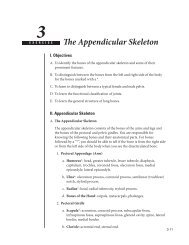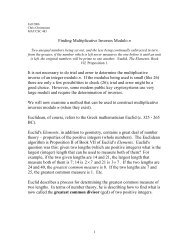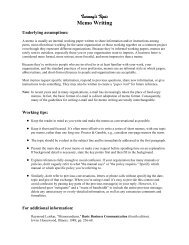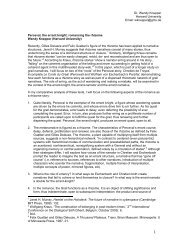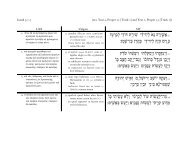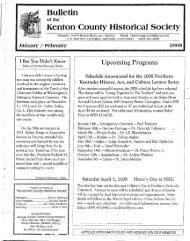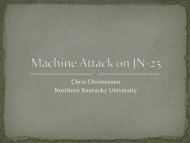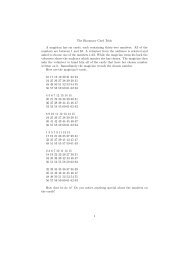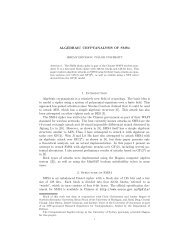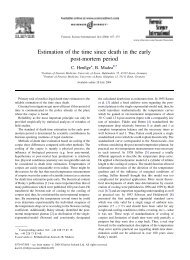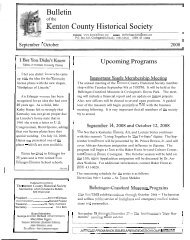An-Nawawi's 40 Hadith
An-Nawawi's 40 Hadith
An-Nawawi's 40 Hadith
Create successful ePaper yourself
Turn your PDF publications into a flip-book with our unique Google optimized e-Paper software.
Selections from <strong>An</strong>-Nawawī’s Forty Ḥadīth Page 4<br />
and their property (except that which is Islam’s by right). 23 <strong>An</strong>d their reckoning is with Allah,<br />
exalted be He.<br />
al-Bukhārī and Muslim relate this.<br />
9 On the authority of Abū Huraira ‘Abd ar-Raḥmān ibn Ṣakhr (may Allah be pleased with him), who said: I heard<br />
the Messenger of Allah (the blessings and peace of Allah be upon him) say:<br />
What I have forbidden you, avoid; what I have commanded you [to do], do as much of it as you<br />
can. 24 What destroyed those [peoples] who were before you was their questionings and their disagreements<br />
with their Prophets.<br />
al-Bukhārī and Muslim relate this.<br />
11 On the authority of Abū Muḥammad al-Ḥasan the son of ‘Alī ibn Abī Ṭālib, the grandson of the Messenger of<br />
Allah (may the blessings and peace of Allah be upon him) and the child of his daughter 25 one much beloved (with whom<br />
and with his mother may Allah be pleased), who said: I memorized from the Messenger of Allah (may the blessings and<br />
peace of Allah be upon him):<br />
Leave that about which you are in doubt for that about which you are in no doubt.<br />
at-Tirmidhī and an-Nasā’ī 26 relate this, at-Tirmidhī saying, “It is a good and genuine Tradition.”<br />
13 On the authority of Abū Ḥamza <strong>An</strong>as ibn Mālik (may Allah be pleased with him), the servant 27 of the Messenger<br />
of Allah (may the blessings and peace of Allah be upon him), that the Prophet (may the blessings and peace of Allah be<br />
upon him) said:<br />
None of you [truly] believes [in Allah and in His religion] until he wishes for his brother what he<br />
wishes for himself.<br />
al-Bukhārī and Muslim relate this.<br />
14 On the authority of Ibn Mas’ūd (may Allah be pleased with him), who said: The Messenger of Allah (the blessings<br />
and peace of Allah be upon him) said:<br />
The blood of a Muslim may not be legally spilt unless he belongs to one of three [classes]: a<br />
married man who commits adultery, one who owes his soul for another soul [i.e. a murderer], and<br />
one who abandons his religion, [thus becoming] one who splits the community.<br />
al-Bukhārī and Muslim relate this.<br />
23<br />
I. e. though they save their lives and continue to hold their property, they must pay to the Muslim rulers the lawful<br />
taxes.<br />
24<br />
<strong>An</strong>other translation: “comply with as far as you are able.”<br />
25<br />
<strong>An</strong>other translation: “the one much beloved of him.” Lit. “and his fragrant flower.” the word raiḥāna was used by<br />
the Prophet in respect of al-Ḥasan and al-Ḥusain, the sons of ‘Alī ibn Abī Ṭālib, the Prophet’s cousin and son-in-law.<br />
26<br />
at-Tirmidhī (d. 279 A. H. = 892 CE) compiled the Jāmi’, which is usually reckoned the third of the six canonical<br />
Collections of Tradition, and an-Nasā’ī (d. 303 A. H. = 915 CE) compiled the Sunan which is generally counted the sixth<br />
of them.<br />
27<br />
<strong>An</strong>as ibn Mālik, when still a youth, was employed by the Prophet as a servant and is the authority for many Ḥadīth.<br />
He is often referred to as “the servant and friend of the Messenger of Allah.” (Ezzeddin and Johnson-Davies)



